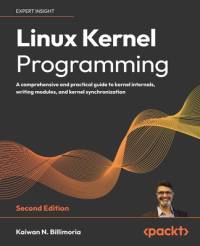Über Linux Kernel Programming - Second Edition
Gain both a firm practical understanding and sufficient theoretical insight into the inner workings of Linux kernel internals, learn to write high-quality kernel module code, understand the complexities of kernel synchronization
Purchase of the print or Kindle book includes a free eBook in PDF format.Key FeaturesDiscover how to write Linux kernel and module code for real-world products
Implement industry-grade techniques in real-world scenarios for fast, efficient memory allocation and data synchronization
Understand and exploit kernel architecture, CPU scheduling, and kernel synchronization techniques
Book Description
The 2nd Edition of Linux Kernel Programming is an updated, comprehensive guide for new programmers to the Linux kernel. This book uses the recent 6.1 Long-Term Support (LTS) Linux kernel series, which will be maintained until Dec 2026, and also delves into its many new features. Further, the Civil Infrastructure Project has pledged to maintain and support this 6.1 Super LTS (SLTS) kernel right until August 2033, keeping this book valid for years to come!
You'll begin this exciting journey by learning how to build the kernel from source. In a step by step manner, you will then learn how to write your first kernel module by leveraging the kernel's powerful Loadable Kernel Module (LKM) framework. With this foundation, you will delve into key kernel internals topics including Linux kernel architecture, memory management, and CPU (task) scheduling. You'll finish with understanding the deep issues of concurrency, and gain insight into how they can be addressed with various synchronization/locking technologies (e.g., mutexes, spinlocks, atomic/refcount operators, rw-spinlocks and even lock-free technologies such as per-CPU and RCU).
By the end of this book, you'll have a much better understanding of the fundamentals of writing the Linux kernel and kernel module code that can straight away be used in real-world projects and products.What you will learnConfigure and build the 6.1 LTS kernel from source
Write high-quality modular kernel code (LKM framework) for 6.x kernels
Explore modern Linux kernel architecture
Get to grips with key internals details regarding memory management within the kernel
Understand and work with various dynamic kernel memory alloc/dealloc APIs
Discover key internals aspects regarding CPU scheduling within the kernel, including cgroups v2
Gain a deeper understanding of kernel concurrency issues
Learn how to work with key kernel synchronization primitives
Who this book is for
This book is for beginner Linux programmers and developers looking to get started with the Linux kernel, providing a knowledge base to understand required kernel internal topics and overcome frequent and common development issues.
A basic understanding of Linux CLI and C programming is assumed.Table of ContentsLinux Kernel Programming - A Quick Introduction
Building the 6.x Linux Kernel from Source - Part 1
Building the 6.x Linux Kernel from Source - Part 2
Writing Your First Kernel Module - Part 1
Writing Your First Kernel Module - Part 2
Kernel Internals Essentials - Processes and Threads
Memory Management Internals - Essentials
Kernel Memory Allocation for Module Authors - Part 1
Kernel Memory Allocation for Module Authors - Part 2
The CPU Scheduler - Part 1
The CPU Scheduler - Part 2
Kernel Synchronization - Part 1
Kernel Synchronization - Part 2
Mehr anzeigen

